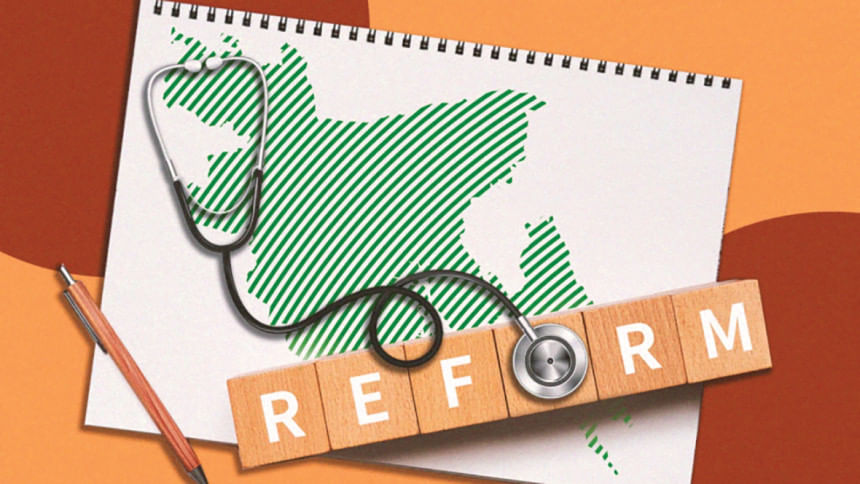Govt shelves several key health reform measures

The government has pushed back the implementation of several key health reform recommendations made by a commission, casting doubts over the future of the reform initiatives aimed at improving public healthcare.Fifteen out of 33 reform proposals, primarily selected from the Health Sector Reform Commission's recommendations, have been excluded from the implementation process following a review by the Cabinet Division, said health ministry sources.This means the health ministry is no longer requir...
The government has pushed back the implementation of several key health reform recommendations made by a commission, casting doubts over the future of the reform initiatives aimed at improving public healthcare.
Fifteen out of 33 reform proposals, primarily selected from the Health Sector Reform Commission's recommendations, have been excluded from the implementation process following a review by the Cabinet Division, said health ministry sources.
This means the health ministry is no longer required to regularly update the Cabinet Division about the implementation of these recommendations, they said.
The excluded recommendations include VAT and tax exemptions on essential antibiotics and medicines used to treat cancer, diabetes and hypertension, and the imposition of higher taxes on low priority items.
Besides, the suggestions for a permanent health commission, a health service for doctors and a separate public service commission for their recruitment were omitted from the implementation list.
The development comes at a time when the health sector is facing numerous challenges, including a funding crunch, a shortage of health workers, high out-of-pocket expenses, unequal access to services, and weak governance.
On May 5 this year, the 12-member reform commission, led by National Professor AK Azad Khan, submitted its report, recommending a sweeping overhaul of the health service management to make it more people-centred.
It suggested that the government make primary healthcare a constitutional obligation and provide it free of cost to ensure universal access.
Contacted on November 6, Prof M Muzaherul Huq, a member of the commission, said, "The measures to implement the commission's recommendations is yet to be visible. If people do not benefit and the steps are not visible to them, the suggestions will become meaningless."
Out of more than a hundred recommendations by the commission, 33 were selected by the health ministry for immediate implementation. Of them, 23 were supposed to be implemented by the Health Services Division (HSD), and the rest by the Medical Education and Family Welfare Division.
The HSD even categorised the 23 recommendations into short- (six months), mid- (one to two years) and long-term (more than two years) actions.
The health ministry regularly updated the Cabinet Division on the implementation status of the selected recommendations, said a ministry official, seeking anonymity.
"More than a month ago, the Cabinet Division struck off 15 recommendations from the list, keeping 18 for regular updates."
In the ministry's progress report, some of the dropped recommendations were marked as "sensitive", which might have led to their exclusion, the official said.
When asked, Health Secretary Saidur Rahman said the Cabinet Division is now seeking updates on the progress of 18 recommendations from the Health Sector Reform Commission and one from the Public Administration Reform Commission.
Regarding the omission of the 15 recommendations, he said in a written reply, "These are big issues which are not easily implementable. They will take a long time."
THE EXCLUDED RECOMMENDATIONS
Several of the dropped recommendations were considered vital for bringing positive changes to the health sector, said experts and officials.
They include the formation of a health commission to develop a health policy; the establishment of Bangladesh Health Service and the promulgation of an ordinance to create a separate secretariat for it; and the creation of a separate public service commission for recruitment and promotion of doctors.
Suggestions for forming a medical police unit to ensure security at hospitals and clinics, and introducing a five-day academic week for medical colleges were also dropped.
Another excluded recommendation was the introduction of a service centre to swiftly deal with licensing and other administrative matters involving private medical hospitals, clinics, and diagnostic centres.
The suggestion to introduce a time-befitting pay scale for health workers in the private sector was omitted from the list as well.
SLOW OR NO PROGRESS
The implementation of several of the 18 recommendations, retained by the Cabinet Division for regular updates, has seen little progress over the past seven months, said health ministry officials.
For instance, the reform commission had recommended the enactment of at least nine laws and amendments to more than half a dozen existing ones related to the health sector.
But the health ministry has so far prepared two drafts -- the Health Service Workers and Institutions Protection Ordinance 2025, and the Patient Protection and Remedy Ordinance 2025, according to the ministry's update report.
It further said the government has been able to partially implement the recommendation to offer primary healthcare free of cost or at subsidised rates.
No steps have been taken yet to implement the commission's recommendation for making primary healthcare a constitutional obligation.
However, there has been some progress in executing the commission's suggestion to keep pharmacies open round the clock at public hospitals and primary healthcare centres. A hundred posts for pharmacists have been created and the process of their appointments is underway, according to the report.
Directives have been issued to all public hospitals to curb the practice of prescribing unnecessary medicines or tests and to stop the use of pharmaceutical companies' prescription pads, the report mentioned.
The health ministry is now conducting "further scrutiny" of at least five recommendations, including the formation of a search committee to recommend appointments to top posts in the proposed health service; the enactment of a health information safety act; and the drawing up of a list of essential diagnostics.